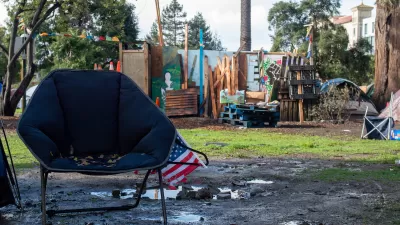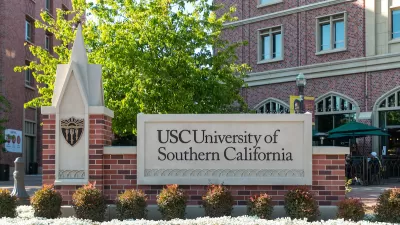Critics of a new provision calling “social noise” an environmental impact say the law can too easily be co-opted by anti-housing groups to block new development.

An opinion piece from early March by Jennifer Hernandez and Robert Apodaca in the Los Angeles Times outlines how community groups have used the California Environmental Quality Act (CEQA) to block new student housing at the University of California, Berkeley.
The authors argue that building more housing close to campus is in fact the more environmentally friendly option. “More students living near campus means less traffic.” But a recent court ruling halted plans for a new housing complex and forced the university to withhold admission from thousands of potential new students, citing the potential impacts of a higher population.
Now, a new court ruling deems noise from college parties an environmental impact, giving NIMBY groups another weapon in their fight against new university housing. The authors see this as a slippery slope to other restrictions. “The concept of ‘social noise’ is perfectly designed to block housing in existing neighborhoods. If this ruling stands, other demographic and individual behaviors could become adverse ‘environmental’ impacts under CEQA.” Meanwhile, the authors point out that students who experience housing insecurity are more likely to drop out, making affordable housing a crucial part of supporting student success.
More on the UC Berkeley story:
FULL STORY: Opinion: How California came to treat UC Berkeley students’ ‘noise’ as a dire environmental threat

Maui's Vacation Rental Debate Turns Ugly
Verbal attacks, misinformation campaigns and fistfights plague a high-stakes debate to convert thousands of vacation rentals into long-term housing.

Planetizen Federal Action Tracker
A weekly monitor of how Trump’s orders and actions are impacting planners and planning in America.

Chicago’s Ghost Rails
Just beneath the surface of the modern city lie the remnants of its expansive early 20th-century streetcar system.

Bend, Oregon Zoning Reforms Prioritize Small-Scale Housing
The city altered its zoning code to allow multi-family housing and eliminated parking mandates citywide.

Amtrak Cutting Jobs, Funding to High-Speed Rail
The agency plans to cut 10 percent of its workforce and has confirmed it will not fund new high-speed rail projects.

LA Denies Basic Services to Unhoused Residents
The city has repeatedly failed to respond to requests for trash pickup at encampment sites, and eliminated a program that provided mobile showers and toilets.
Urban Design for Planners 1: Software Tools
This six-course series explores essential urban design concepts using open source software and equips planners with the tools they need to participate fully in the urban design process.
Planning for Universal Design
Learn the tools for implementing Universal Design in planning regulations.
planning NEXT
Appalachian Highlands Housing Partners
Mpact (founded as Rail~Volution)
City of Camden Redevelopment Agency
City of Astoria
City of Portland
City of Laramie





























